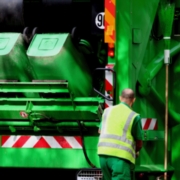A prospect not to be wasted: Bury Council’s three-weekly residual waste collections
The UK may well miss its 2020 recycling targets unless changes are made now. In England, the recycling, reuse and composting rate reached 44.8% in 2014, yet there are concerns that waste is starting to increase again as the economy recovers. We’ve reached the point where national action needs to be taken. This action not only needs to emphasise the importance of recycling to everyone in the country but is also required to create jobs in the reprocessing sector, reduce the reliance on virgin materials, protect the environment, and help us to avoid substantial EU fines.
Increasingly, many councils believe that the only way to improve their recycling, reuse and composting rate is to force residents to separate their recyclable materials more effectively, rather than simply putting them all in residual waste bins. Many local authorities were already promoting this approach by collecting residual waste less frequently when at Bury Council, we started our own review into the future of our residual waste collection service.
Faced with increasing financial budget cuts, the council was forced to review the cost of its service and our ability to meet recycling targets. We found that we were paying £28,000 a day to dispose of waste, amounting to £10.2 million each year. A huge amount of the waste was, in fact, recyclable and by increasing the recycling rate by 10%, our review found that the council could potentially make savings of almost £1 million per year.
Before turning to three-weekly collections, the council considered the available options carefully, and deliberated over the idea of introducing 140 litre residual waste bins, to be emptied fortnightly. However, the cost of buying the new bins (around £1.1 million) was unreasonable. We also believed that these new bins would have a similar impact on recycling performance as three-weekly collections, whilst keeping our existing bins, so we opted to try the new collection service.
Before the service was introduced, we launched a comprehensive communications campaign, raising public awareness about the forthcoming changes. New rounds were formed that had minimum disruption to residents. Collection crews underwent training and customer engagement courses, and ‘Frequently Asked Questions’ were published for both staff and customers. Additional staff resources were placed in the council’s contact centre to help cope with initial queries from the public. In addition, officers carried out visits to any concerned residents. The council also offered a 240 litre bin to those residents who were using the smaller 140 litre bins to compensate for the reduced amount of collections. Residents could also request additional recycling bins.
Once the scheme began, an effort was made to ensure a smooth running service; special dispensations were allowed, such as returning to collect any missed bins for the first four months. Also, Waste Regulatory Officers were assigned to collection crews to help with any queries, and extra promotional activities were used in areas where participation rates were low.
The scheme has now been operating for over twelve months and has seen considerable success. Less than 5% of residual bins have been presented with lids up and very little side waste has been encountered. Street cleansing tonnages have reduced, which was an added benefit, as there was a worry that fly-tipping of domestic waste could have been a consequence of the new system. Most importantly, recycling rates have increased by almost 10% across green waste, paper and dry recyclables, and residual waste collected has fallen by almost 17%. Putting this in context, in July 2015 Bury Council achieved a recycling rate of 59.69% of our domestic waste collection. We expect to hit the 60% recycling rate by the beginning of 2016 whilst making savings of around £860,000 per annum.
To mirror Bury’s success, councils need to have extensive recycling services in place, yet it can seem like a financial gamble to invest in recycling right now. Local authorities’ budgets are already stretched but it is possible that by providing efficient, cost-effective recycling services, the improved recycling capture rates will soon offset the costs for the developments needed. Bury’s new waste collection service has proved that this is a possibility.
So could this work for any council? Well, as with any scheme, there are a number of things to consider before moving to a three weekly residual bin collection service. For example, it may be more effective – and cheaper – to increase education and communication campaigns, or to reduce the size of the bins to 140 litres. If three-weekly collections are the most viable option financially, ensure that the residents have been consulted and concerns, such as hygiene fears and increased fly-tipping, are satisfactorily addressed. It is vital to implement a good communications strategy in order to minimise disturbance and distress for local residence.
Whilst Bury was the first English Council to move to the three weekly services there are other examples across the UK where three weekly collections appear to be working well and, with increasing pressure to meet recycling targets, it seems to be an excellent way forward. However, it requires careful planning and consideration.


.png)



.png)